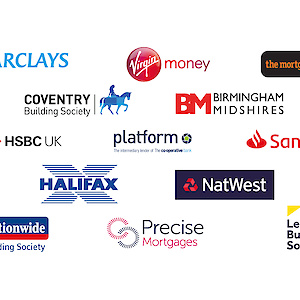


Head of Content

Mortgage Advisor & Director

Need to remortgage your home but have a history of bad credit? We can help! In this guide, we explore the options available if you’re looking to remortgage with bad credit and arrears. We’ll explain what criteria you’ll need to meet, which lenders are more likely to accept you, and how to get the most competitive bad credit remortgage rates available.
Can you remortgage with bad credit?
Yes, you can often remortgage your home if you have a history of bad credit, although it can be more complex than for those who don’t have credit issues. There are certainly lenders who may decline your application, so it’s important to seek guidance on the type of mortgage providers to approach. However, some specialist lenders, often referred to as ‘sub-prime lenders’ deal specifically with adverse credit applications, so can be more flexible with their criteria.
How difficult will it be?
It can be more difficult than if you had good credit, but it depends on the severity of your credit issues and your broader circumstances. If your credit issues are fairly minor, such as a few missed payments or CCJ, there are some high street banks that may consider your application. However, those with more serious credit issues, such as IVAs, will usually need to remortgage with a sub-prime lender. The purpose of your remortgage can also be a factor. For example, you're less likely to be approved to remortgage with the intent of increasing your borrowing than just because you're deal has come to an end.
Because there are fewer bad credit remortgage lenders and deals available to you, the more serious your credit issues are, it can be harder to find a suitable product. The key is to seek advice from a mortgage broker with experience in securing remortgages for clients with adverse credit. They know which lenders will take a broader view of your application, and will be more likely to either overlook some minor credit problems, or be willing to consider the circumstances surrounding them.
Much like any bad credit mortgage, it will be easier for those who meet other mortgage criteria well, such as affordability and stability of income. Equally, those with more equity in their home will usually qualify for a bad credit remortgage more easily, as this reduces the risk to the lender.
How your bad credit will be assessed by lenders
Most lenders consider the age, severity, and reason for your poor credit. Less severe and older credit issues tend to be less troublesome than more severe or more recent ones. This table depicts how lenders tend to rank credit issues; however, keep in mind that criteria do differ from one lender to the next, especially when it comes to the age of your credit problems and the size of the debts involved.
|
Type of Bad Credit |
Severity |
|
Not severe |
|
|
Not severe |
|
|
Not severe |
|
|
Severe |
|
|
Severe |
|
|
Severe |
|
|
Severe |
|
|
Severe |
|
|
Severe |
|
|
Multiple credit problems |
Very severe |
|
Very severe |
|
|
Very severe |
Those borrowers with credit issues towards the more severe end of the spectrum can usually still find a deal, although keep in mind that rates will be less favourable, the greater the risk to the lender.
General eligibility requirements
Each lender has their own criteria when it comes to the level, age, and size of your bad credit issues. What is considered a low credit score also varies from one lender to the next, and the actual number related to the score can be irrelevant, as different credit reference agencies use different scoring methods. However, the criteria mortgage lenders will generally use to gauge your eligibility for a remortgage are as follows:
- How much equity you hold: Where bad credit is involved, average equity requirements are around 15-20%, but can be higher depending on the age and severity of your bad credit. A remortgage with bad credit and no equity is unlikely to be possible, but always speak to an expert before ruling it out entirely. See the section below for detailed information about equity requirements.
-
Age: This can be more relevant for remortgage applications as some lenders won’t allow the new mortgage term to stretch past your 75th birthday. Others will draw the line at 85 years old. However, a few mortgage lenders have no upper age limits, and you may also be able to consider a retirement interest-only (RIO) mortgage if you’re unable to qualify for a traditional remortgage due to age restrictions
-
Affordability: If you’re remortgaging with poor credit, it’s likely that the interest rates available will be higher than on a typical remortgage. This could mean that you won’t see any fall in your repayments, even if you have a reasonable level of equity. Lenders will still want to be sure that you can afford them, so if you’ve recently had a fall in income, or become self-employed, it can be harder to qualify
-
Property type: If your property has non-standard construction features such a thatched roof, steel frame or concrete construction, a specialist lender might be required. This is more likely to be an issue if you are switching to a new lender, or if the non-standard features were added after you took out your original mortgage
Equity requirements
The table below reveals how much equity you will need to hold to remortgage with each type of bad credit. The information was accurate at the time of writing.
|
Type of Bad Credit |
Approximate Amount of Equity Needed |
|
Late payments |
From 10% |
|
No credit history |
From 10% |
|
No credit score |
From 10% |
|
Missed payments |
From 15% |
|
Defaults |
From 15% |
|
Debt management plans |
From 15% |
|
County court judgements |
From 15% |
|
Arrears |
From 15% |
|
Individual voluntary arrangements |
Up to 30% |
|
Multiple credit problems |
Up to 40% |
|
Repossessions |
Up to 40% |
|
Bankruptcies |
Up to 40% |
Please note that the equity amounts listed above are estimates based on the average amount needed for each credit issue. The exact amount you are required to put down may vary depending on how old the issue is and other eligibility factors.
Will it impact a joint remortgage if one applicant has bad credit?
Yes, the applicant with poor credit will impact a joint remortgage application. However, lenders will consider the credit records of both applicants, and it's possible that the other applicant may balance some of the risk to the application, especially if they have a strong credit score.
Lee Trett, director and mortgage adviser at Teito, has provided insight on this question below:

Lee Trett - Mortgage Advisor & Director
Things to consider before you apply to remortgage with bad credit

Below you’ll find a short list of important things to consider and talk over with your mortgage broker before you get started with your remortgage application.
Are there any quick ways to improve your credit?
Yes, there are some fairly quick improvements you can make to your credit rating that may make remortgaging simpler; however, keep in mind that this will depend on the severity of your bad credit and how quickly you need to remortgage.
This could include:
Check your credit reports: You can download your files by accessing a free trial on our Checkmyfile. Reviewing your credit reports is important as it gives you the chance to challenge any inaccuracies and have outdated information removed. Doing this can strengthen your position when it comes to filing your remortgage application.
Calculate your loan-to-value ratio: To do this, divide the amount you need to borrow by the value of the property and multiply the total by 100. This will help give you an idea of the approximate number of lenders you can approach for your application.
Speak to a mortgage broker: This is advised if you have bad credit as there are brokers who specialise in arranging remortgages for borrowers with adverse. With their knowledge, experience and lender contacts, they can find your ideal lender, boost your chances of approval and help you secure the best possible rate.
Could you remortgage to consolidate debt?
Some lenders allow you to consolidate your debts into your remortgage, although this will depend on how much they are, how much equity you have, and what you can afford to repay each month. Mortgage providers who are happy to consider a remortgage to release equity for this purpose usually have a loan-to-value (LTV) cap of around 60-85%, so you’ll need to hold 15-40% equity in your home.
Mortgage interest rates, even on bad credit mortgages, can be lower than the rates charged on loans and credit cards, although if you’re using a debt management plan or IVA, you won’t be paying interest.
It’s important to speak to an experienced broker or specialist debt adviser before considering a debt consolidation remortgage to ensure you’re making the best choice for your circumstances.
What interest rate to expect
Interest rates are generally higher for remortgage customers who have bad credit, with the exact rate you qualify for determined by the circumstances around your adverse, the amount of equity you hold and the overall strength of your application.
You can compare the latest bad credit remortgage rates online using our free mortgage sourcing tool below. This tool has been set to show results from specialist adverse credit lenders by default, but you can manually adjust it to show the whole of the market via the filters tab in the bottom left.
Compare Rates
Showing Top Result Results
No results matching your criteria
Lender Details
Product Details
How much will your new repayments be?
There are no bad credit remortgage calculators available, as this type of mortgage is assessed on a case-by-case basis. However, our standard remortgage tool can provide a rough estimate of what your new repayments could be based on your current level of equity:
Which lenders consider bad credit remortgages?
A mixture of specialist mortgage lenders and high street banks and building societies offer remortgages for people with bad credit, but what they will and won’t accept can vary.
Here is just a handful of the lenders who offer bad credit remortgages and examples of the specific criteria they use:
- Nationwide: Will let you remortgage with a bankruptcy on your credit reports, as long as the issue was discharged at least three years ago.
- Bluestone: Will disregard any county court judgements for less than £300 for remortgage customers. They allow a maximum of three CCJs to have been registered within the last three years, as long as none of them were in the last six months.
- Pepper Money: Will offer a remortgage to homeowners in debt management plans that have been in place for at least 12 months. They require proof that the DMP payments are being made on time and in full and that none of them have been missed.
- Aldermore: Will consider a remortgage application when the borrower has missed payments on a credit agreement, as long as none were in the last three months. The borrower cannot have fallen into more than two months’ arrears in the last 23 months.
- Halifax: Can potentially accept remortgage applicants with missed or late payments, but will use credit scoring when making their final lending decision.

Secure your remortgage today
Why use Teito for your bad credit remortgage?
Teito’s mortgage brokers are experts when it comes to bad credit remortgages; they know which lenders are most open to your specific types of credit issues, and in some cases can access exclusive deals.
If you have adverse credit or are concerned that your credit score is not high enough to remortgage, here are some great reasons to choose Teito to help you:
-
We provide a free remortgage rate comparison that’s tailored to your individual circumstances
-
We have access to over 90 lenders, and exclusive rates
-
Our mortgage brokers have expert knowledge in bad credit remortgages and are 5-star rated across multiple review platforms
-
Your initial consultation with us is always free of charge
Ready to get started? Make an enquiry online to set up a free, no-obligation chat with a bad credit mortgage advisor who specialises in remortgages today.
FAQs
Yes, potentially, but there will be fewer lenders available to you. Higher interest rates are probable, and the deposit/equity requirements could be up to 40%.
In complex situations like these, it is recommended that you speak to a mortgage broker.
Choosing an Adviser
Selecting a qualified and experienced mortgage adviser is of great importance. To choose a suitable adviser, evaluate their qualifications, experience, and reputation, and ensure they are regulated by the Financial Conduct Authority (FCA).
Read reviews from previous clients and make sure they provide a clear explanation of the products and services they offer, as well as the fees and charges associated with them.





















































































































































